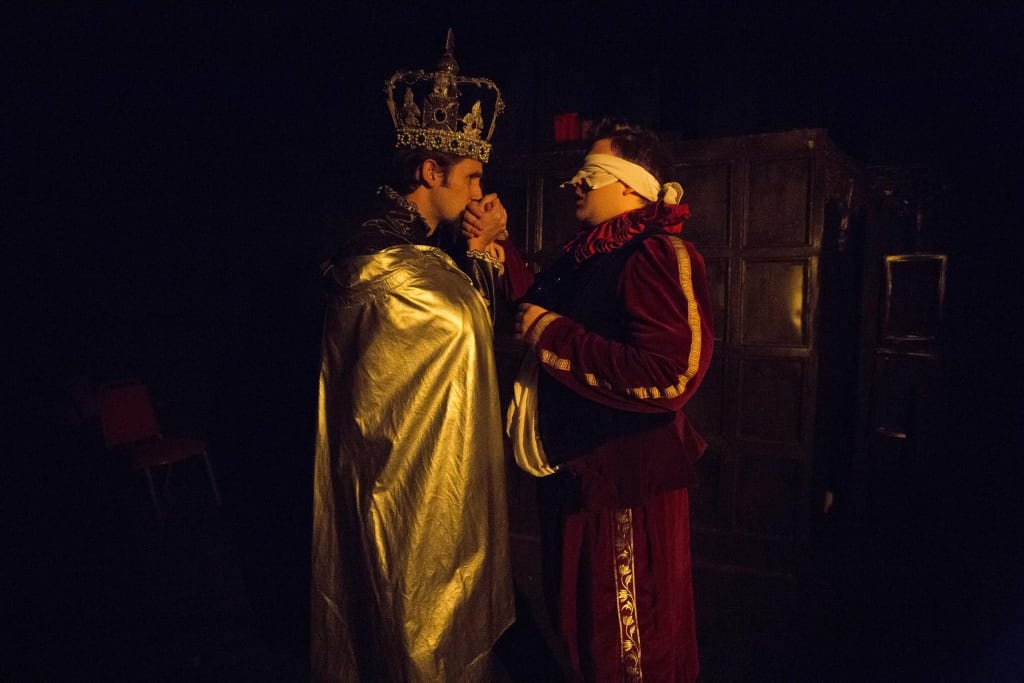Foul Pages is no ordinary Shakespeare’s play. Instead of watching As You Like It itself, the audience is transported back to 1603 to witness Shakespeare and his company’s production behind the scenes. Set in Wilton in Wiltshire, the play tells of the employment of the playwright by Mary, the Countess of Pembroke, to write the now world-renowned As You Like It to please King James I in an attempt to free the condemned Sir Walter Raleigh. In the process, Shakespeare and the actors struggle between fulfilling the mission and forgoing their artistic integrity as they rewrite and rehearse. Artists compromise. Friends turn against each other. Lovers question their sexuality.
Heavy the themes may seem, but the play turns out to be a modern rollicking romp as gender politics is presented in delightful and unexpected ways. No, love is no longer conveyed in the old-fashioned way of offering a chain by maidens or the earnest proclamations of oohs and ahhs between lovers with concealed identities. Rather, right from the beginning, fair young boys blatantly embrace on stage, taunt, tease and kiss while the jealous maid, Peg, confronts the man she adores but only to discover that he is a homosexual. Writer Robin Hooper further sexes it up by weaving in dirty jokes—as, oh well, Shakespeare did—that promise a hearty and unapologetic laugh at the ‘dignified’ Catholic High King’s infatuation over a plumb pretty boy.

The cast deliver brilliant performances by portraying their characters with distinct personalities, social positions and personal ambitions through subtle gestures, tones, accents and, most outstandingly, the expressions in their eyes. For instance, the vengeful stares of the torn prodigious actor Alex whose lead female role is stolen blaze with maliciousness whereas Rob (the new Rosalind)’s morose eyes plead with helplessness and the burning desire to reconcile. The props—a dagger and an apple—may be simple, but their expressive eyes vivify their characters with power.
One of the most impressive characters is a dog called Chop. A half-naked dog which barks, whines, enjoys having his tummy scrubbed and at the same time wears an Elizabethan Ruff Collar and speaks may seem like a weird mutant. Yet James King successfully turns Chop into a lovable character with his humourous and convincing acting. Not only does Chop offer comic relief through sarcastic remarks and witty manipulation of the human characters; it is also, plot-wise, the most significant character in revealing off-stage scandals while others stumble in the dark.

The full use of space is another highlight of the play as characters walk between seats or Chop, as expected of a dog, happily comes close to the audience and smells their feet. Moreover, actions, signalled only by dialogues, sometimes unfold at the backstage to provide a multi-dimensional theatrical experience and signify the simultaneous occurrence of various events. Clever designs of laundry conveyor ropes across the stage, trap windows on walls, stage equipment that controls the dramatic draping of cloths as well as meticulous lighting arrangements enrich the visual experience.
Directed by Matthew Parker, Foul Pages unshackles contemporary audience from the conventional impressions of anything Shakespearean and guarantees an outrageous night of sexiness and laughter.

